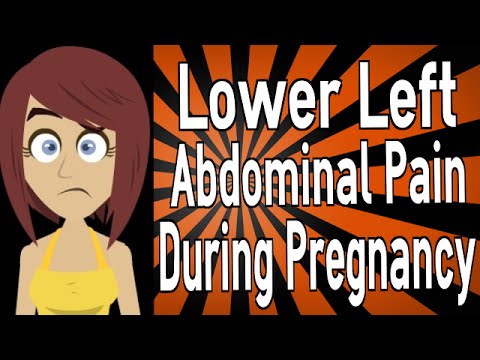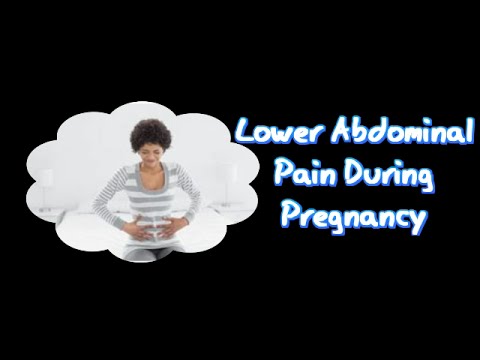Abdominal Pain During Pregnancy

Contents:
- Abdominal Pain in Pregnancy
- Stomach Pains in Early Pregnancy
- Causes of Pain in Late Pregnancy
- Acute Pain in Pelvic Area
- Dragging Pain in Lower Abdomen
- Pelvic Pain
- Abdominal Tightening
- Baby Kicks Pain
- How to Relieve Pain?
- When to See a Doctor?
Abdominal Pain in Pregnancy
Is it possible to have abdominal pain during pregnancy? It actually is possible and happens quite often. Most often abdominal pain is caused by physiological changes, and though it can cause a slight discomfort to a future mom, it’s quite normal. Some pains can be even pleasurable for some moms. So what actually causes those pains?
Stomach Pains in Early Pregnancy
Pains in lower abdomen during pregnancy can be divided into two groups according the reasons of their occurrence: obstetric and non-obstetric.
Non-obstetric pains include those provoked by gastrointestinal tract’s problems, stretching ligaments, surgical diseases (appendicitis) or overexertion of ABS muscles. Obstetric pains are those which involve the threat of termination of pregnancy, early placenta detachment, or an ectopic pregnancy.
In any case, only a professional can determine the pain’s nature and reason. However, you can be absolutely sure that everything is perfectly normal, if you have the following signs in early pregnancy:
- Light cramps that quickly go away. Such sensations either in one part of the abdomen or across it may be caused by ligaments’ stretching due to the increasing uterus.
- Regularly recurring cramps in the lower abdomen may indicate an internal restructuring of the body.
- Light cramps accompanied by blood discharge in the time of a due menstruation or during first 7-10 days after the conception, are as a rule absolutely safe. They are caused by the process of the attachment of a fertilized egg to the uterine wall and early development of an embryo. This is normal and shouldn’t cause any concerns.
However, be careful about changes that undergo in your body during first months of pregnancy. Pain in the abdomen might be caused by a spontaneous abortion (miscarriage in people).
Causes of Pain in Late Pregnancy

In late pregnancy, pains in the abdomen aren’t always caused by a threat of a miscarriage or any pathology. There can be several reasons.
The first reason is the wrong diet or schedule of meals, which causes cramp of the digestive system accompanied by pain. The same symptoms are proper for disbacteriosis and colitis. Thus, the intestines copes badly with poorly treated food, stale foods, abundant meals, which causes bloating. When the digestive process ends, such a pain goes away, but it tends to return. In such a case, you need to carefully review your diet and meal times.
Don’t forget, that close to the birth, the growing uterus squeezes the intestines. Moreover, hormonal changes put the double burden on the intestines. During this period, the motility and peristalsis are reduced. Constipation is also quite frequent, and it causes pulling pain in the lower abdomen. Recall that in order to prevent constipation you should consume more products containing raw fiber, drink enough water and walk outdoors.
The second reason is ligaments’ stretching. Ligaments support the uterus. The increasing uterus causes ligaments’ stretching. And in late pregnancy, this often causes gentle spasms in the lower abdomen, or painful sensations on one or both sides of the belly. Such a pain is more pronounced when you change positions, laugh, sneeze. It is sharp, but goes away quickly. In addition, such symptoms can be accompanied by stretch marks’ appearance on the abdomen.
The third reason of abdominal pain in pregnancy is excessive load on your ABS. Such painful sensations often occur during or after physical exercise. To avoid it, simply take a rest and relax.
The fourth cause is intestinal obstruction, appendicitis or pancreatitis. Despite the fact that such reasons are quite rare, if you have such symptoms as growing stronger pain, fever, nausea and dizziness, be sure to call an ambulance. You might need a surgery.
The fifth cause are gynaecological problems testifying of improper pregnancy course and health problems.
The sixth reason is the threat of miscarriage. Pain in the lumbar area often feels like contractions and doesn’t go away without drugs intake. If it's a premature termination of pregnancy, pain will be accompanied by vaginal discharge varying both in color (from light-brown to bright red) and in abundance. In such a case, immediately consult your doctor, this might be essential to save the baby.
The seventh reason is the premature detachment of the placenta that may occur either in late pregnancy or immediately before the birth. This condition can be triggered by physical overexertion, injury of the abdominal area, specific diseases (hypertension, toxemia, etc.). Severe pain in the lower abdomen accompanied by uterine bleeding is explained by the fact the placenta detachment triggers vessels’ rupture. Such a condition is dangerous for both the baby and the woman, so immediately call an ambulance. Most likely an emergency delivery will be required.
Acute Pain in Pelvic Area
The uterus is held between the hipbones with connective-tissue ligaments. During pregnancy the uterus increases its weight causing the ligaments to stretch, which creates abdominal pain. Usually that kind of pain can be felt in the lower abdomen near the pelvis.
Usually this pain happens when a woman changes her body position (for example, turning too quickly), lifts a heavy weight or even sneezes or coughs. All that causes a sharp but short painful sensation that wears off on its own.
This pain can happen on any stage of the pregnancy. Sometimes they can happen less often or even disappear towards the end of the pregnancy. This abdominal pain is harmless for a future mom and her baby and doesn’t need to be treated.
Dragging Pain in Lower Abdomen

The hormones produced during pregnancy affect the gastrointestinal tract so that food travels more slowly. That causes overdistension in some parts of intestinal tract and constipation. A woman can feel a dull aching pain in the sides of the lower abdomen (often in the left side) and have gas.
The discomfort disappears as soon as the food is digested but can happen again if a woman doesn’t stick to a healthy diet. To avoid constipation, one needs to drink more water, eat fermented dairy products and foods rich in fiber (raw vegetables, fruits, whole grain bread). A good way to combat constipation and abdominal pain is to have some moderate physical exercise.
Pelvic Pain
During the pregnancy the body produces a special hormone called relaxin. That hormone influences the cartilage, ligaments, and bones of pelvic floor. This hormone softens the ligaments of the hipbones, which allows them to stretch to make it easier for the baby to travel through the pelvic ring during the delivery.
More often it’s the symphysis pubis joint that moves and causes pain in the lower abdomen. The pain can vary from minor sensation to a more intensive one. It can be triggered by walking, changing your body position, sitting on a firm surface, walking up the stairs or lifting your legs while lying down.
A bandage can help reduce the pain. Another way of fighting this type of pain is a big soft fit ball that can be used instead of a chair. A visit to an osteopath can also be of help.
Abdominal Tightening
Starting in the 2nd trimester, a pregnant woman might experience an abdominal tightening, a condition when the uterus feels as hard as a stone. It can last from a few seconds to up to couple of minutes and happen up to 10 times per day. Those are practice contractions (Braxton Hicks contractions). This type of contraction is not too painful, but still can cause a discomfort and scare a future mom. It’s quite normal to have Braxton Hicks contractions: this is the way your body is preparing to the baby birth.
Baby Kicks Pain
In the second part of the pregnancy baby grows very fast. It can't move freely in the uterus anymore. The baby's movements are less frequent but more intense and powerful. Those baby kicks can cause discomfort or even pain in the hypochondriac quadrant or lower abdomen (especially if the bladder is full). As unpleasant as they are these pains are natural and harmless.
When you experience painful baby kicks try to change your body position: bend forwards, get up, lie down on your side. Relax and take a couple of deep breaths, rub your belly and talk to the baby asking him to relax. Sometimes it's all what it needs.
How to Relieve Pain?
When you feel pain, sit down, pull legs forward and relax. If you rest, the pain will quickly go away.
You can also do the following:
- Avoid sudden changes in body position, especially sharp turns in waist.
- Take a walk, do some light physical activity (housework, for example), change your body position more often, it will help to relieve pain caused by flatulence.
- Put on the lower abdomen a liter bottle filled with hot water, wrapped in a towel or a heating pad (you aren’t recommended to take a larger bottle).
- Take a warm bath or shower.
- Make sure that you drink enough fluids.
When to See a Doctor?
Although light pain in the abdomen is normal for pregnant women, severe pain or cramps could testify of a serious problem. Severe pain can be caused by intestinal infections, food poisoning, urinary tract infection, appendicitis, kidney infection, kidney stones, gall bladder diseases or pregnancy complications (such as pre-eclampsia). If you have severe and/or persistent pain, consult your doctor immediately!
The same should be done if you have the following symptoms:
- strong intestinal colic;
- vaginal bleeding/spotting;
- fever or chills;
- dizziness and weakness.
That’s nice to know about pregnancy ,because sometimes you don’t know what’s going on .At least hear it explains everything.